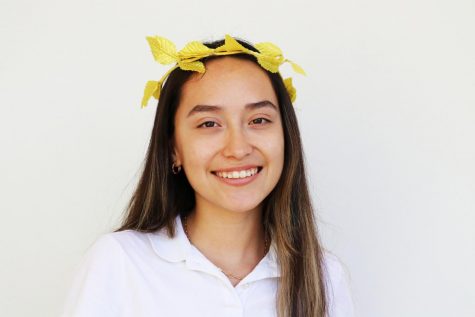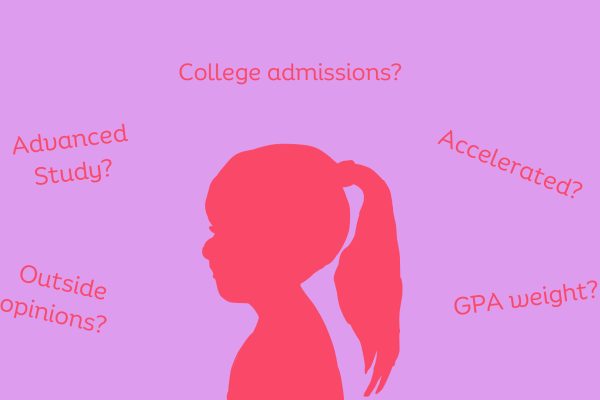Column: Latina Girl in an Archer World

Photo credit: Miaya South
Victoria Pinkett, Anaya Nwachuku Thompson, Leslie Castaneda and me (all ’20) work together on a project. Archer’s diversity has been an important part of my high school experience.
Everyday when I step off the Archer 805 bus, I am transported to my other reality. I have left Archer’s beautiful lawns and pristine buildings, and I find myself surrounded by the familiar faces and places I grew up with.
It is insane to think about how vastly different my school life is from a little over a year ago, but I would not change it for the world.
I grew up in a primarily low-income, Latino community where I was greeted by people like me everyday. This meant my school was mostly Latino kids from the area, creating an environment of little to no diversity. I had little exposure to interacting with people of other races and during these years; I didn’t think too much about expressing my pride for my culture because it almost felt like a given.
However, once I applied to Archer, conversations I had with people and the topics brought forward began to change. When I talked to family members about my then prospective school, they spoke about the area it was in, how many white people went there and questioned how I could possibly become associated with the school. Students at my old school were even less supportive and joked about the idea of being “white-washed.” Even students of color I knew, who already attended schools like Archer, discussed their experiences with culture shock. Some talked about not fitting into the lifestyle students at their new schools had and the awkward conversations in history class.
I chose not to let it bother me, since I believed I had a strong grasp on my identity and morals. I assumed a school would not change who I was.
Oh, how I was wrong.
My first couple of weeks at Archer were different — as expected, but not just in workload, intensity of classes, transportation and resources. The amount of diversity impacted not just my experience and perception of Archer, but also the way I viewed the world around me.
Archer’s diversity gave me the space to be uncomfortable but inspired at the same time. At first, I wasn’t used to the environment and struggled to find my place in the community. I wasn’t used to not seeing people like me at all times and found myself panicking when someone from my friend group, made up mostly of people of color, wasn’t in my class. At my old school, I was very involved, so this new feeling stung; I felt like I wasn’t being myself. I was not comfortable saying certain things in class and found it difficult to share about my life outside of Archer.
However, as the year progressed, that changed. I began to realize that being uncomfortable lead to the most important breakthroughs and conversations.
Whether it was discussing geographically dependent food deserts in Meg Shirk’s history class or colorism and privilege in Hermanas Unidas, difficult conversations occurred, and I was ready to take them on.
Through my experiences as a freshman, I recognized that being outspoken and having pride in my Latina culture was meaningful and worth talking about. I got to interact with cultures I was never exposed to and found a passion in advocating for social issues. In the classroom, I now approach class discussions differently, because I’m more confident in bringing an unique, alternative view to the table.
According friends from my old school, I “became more vocal” and “stand up more for what [I] believe in” after going to Archer. One even said that I have become “more independent;” I went from “naive, to educated about the real world.”
All I can do is smile contently as I write this. I look back at last year and compare it to this year, feeling relieved. Relieved because I feel fearless and ambitious as we start the 2017-2018 school year. It’s going to be a good one.

Celeste Ramirez joined the Oracle as a columnist in 2017 and is now the Multimedia Editor. Her column focuses on diversity at Archer, highlighting the...












Omari Benjamin • Oct 8, 2017 at 10:29 pm
Wow Celeste. This is really really good. Great job.
Beth Gold • Oct 3, 2017 at 6:30 pm
Wow Celeste, thanks so much for sharing these powerful insights about the way being in a diverse community has benefitted you. It is students like you who embrace difference and discomfort to find deeper understandings and connections that make Archer such a special place. It makes me so happy to read that you are finding your voice and feeling more empowered to share it. I hope to hear it more often!
Meg Shirk • Oct 2, 2017 at 9:36 am
Incredible column, Celeste!